'PASSION' PRESS SCREENING
VIDEO OF DE PALMA, NOOMI, PINO AT PRESS CONFERENCE, TRANSCRIPT, REVIEWS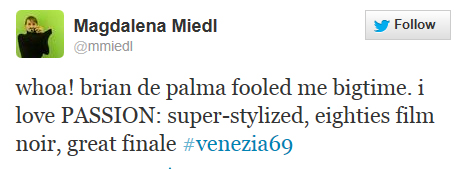
 De Palma working with Passion screenwriter on remake of Heat with Jason StathamDE PALMA MENTIONS STORYBOARDING THE SHOTS, ETC...
De Palma working with Passion screenwriter on remake of Heat with Jason StathamDE PALMA MENTIONS STORYBOARDING THE SHOTS, ETC...(
Thanks to Jochen!)
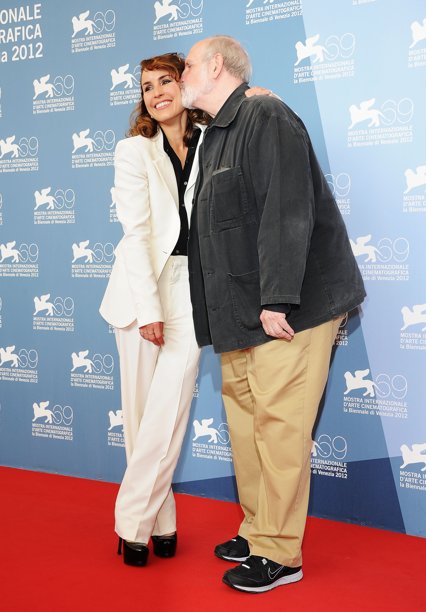 A press screening of Brian De Palma's Passion this morning at the Venice Film Festival reportedly "drew jeers after it was screened to the press." A report out of Italy states that there were whistles and laughter at the screening, although a German review of the film says it is deliberately funny, with direct and indirect Hitchcock quotes, De Palma quotes, but also "great scenes" with nightmare effects. "Games, surprises, plagiarism, stairs and masks and fetishes are the leitmotifs of the film," writes Rüdiger Suchsland, who adds that "the production had far too little money" for De Palma to flaunt his visual prowess.
A press screening of Brian De Palma's Passion this morning at the Venice Film Festival reportedly "drew jeers after it was screened to the press." A report out of Italy states that there were whistles and laughter at the screening, although a German review of the film says it is deliberately funny, with direct and indirect Hitchcock quotes, De Palma quotes, but also "great scenes" with nightmare effects. "Games, surprises, plagiarism, stairs and masks and fetishes are the leitmotifs of the film," writes Rüdiger Suchsland, who adds that "the production had far too little money" for De Palma to flaunt his visual prowess.
Indiewire's Italian film critic Tommaso Tocci writes, "If it weren’t for 2007’s Redacted, Passion would be a neat, coherent follow-up to both Femme Fatale and The Black Dahlia in Brian De Palma’s filmography, in addition to being a rehashing of many of the director’s themes and trademarks." He later adds, "At times it feels like a parody, like a self-conscious, deliberate repetition of old solutions to new visual problems. Constantly pulling away from the characters, the camera traces sinuous trajectories in the air with no noticeable result. Everything feels stiff, as if each shot were only a stripped-down placeholder. The more visceral experimentalism of Redacted, however problematic, felt comparably much more lively (bagging a Best Director award in the process, right here in Venice). That was a new direction; this film is a retracing of the director’s footsteps, albeit without quality in mind. The latter part of the movie proves that De Palma is still perfectly able to engage his own legacy and put a spin on it, but it’s also proof that the preceding part is simply unworthy of his talent. An anticlimactic conclusion for the Venice Competition, but hopefully yet another step in the evolution of a great director."
The Hollywood Reporter's Neil Young calls Passion a "convoluted Euro-thriller" that "represents a disappointingly anaemic stab at a comeback from Brian De Palma." Young suggests that while the star presence of Rachel McAdams and Noomi Rapace should garner distribution in the U.S., the film is likely headed for cult status. Regarding Karoline Herfurth's character, Young writes, "the emergence of Dani in the picture's second half ranks alongside the script's few welcome surprises." Young adds, "By this point, however, proceedings have taken a wayward turn down some unfortunate dead-end alleyways. A grisly murder, the ensuing police investigation - featuring some blundering but impeccably Anglophone cops - and the questionable mental state of a key character are cues for De Palma and his veteran Spanish cinematographer José Luis Alcaine to unleash all manner of distorted lighting-effects and camera-angles." Young finds the Pino Donaggio score to be "heavy-handed," and highlights the film's split-screen sequence: "The director does get to deploy his trademark split-screen technique in one attention-grabbing sequence juxtaposing ballet and murder that achieves the desired confusion in terms of narrative sleight-of-hand." However, Young felt the film indulges in a sort of "greatest hits." However, a review I have heard from a discerning critic who is very familiar with De Palma's work found the "greatest hits" factor of the film to be quite a bit of fun, harkeing back to De Palma's Raising Cain.
Screen Daily's Lee Marshall feels that "De Palma glues together what feel like two different films in the remake [of Love Crime]: a female rivalry drama-thriller, and a murder mystery. And although the exercise carries an undertow of tongue-in-cheek pastiche, this is so inconsistently applied that if feels like an escape clause." Marshall appreciates Donaggio's score, "with its nods at seventies and eighties Italo genre fare," but is unimpressed with the split-screen sequence, calling it "a waste of the technique, as there is little dramatic or thematic connection between what we see on each side of the split." Marshall also writes that some of the dialogue provoked bursts of laughter during the press screening.
Variety's Justin Chang gives Passion an enthusiastically mixed review, writing, "Clearly, Passion means to be a hoot, a wet-dream thriller for cinephiles. But by the time it reaches its overwrought final act, the picture has generated neither the tension of its forebears nor the audacity that would allow it to transcend its silliness, a la De Palma's 2002 tour de force, Femme Fatale. Yet even in the absence of stellar material, the leads remain compulsively watchable: McAdams may lack Scott Thomas' hauteur, but more than makes up for it in cool, svelte malevolence, while Rapace provides an energetic counterweight, lending her more naive but also more unpredictable Isabelle an edge of dark desperation."
AN ASIDE: KRISTIN SCOTT THOMAS SPEAKS ABOUT DE PALMA AT VENICE
The Hollywood Reporter also caught up with Kristin Scott Thomas, who is at Venice to promote her role in Pascal Bonitzer's Looking For Hortense. HR's Alexandra Zawia asked Scott Thomas about De Palma's remake of Love Crime, which she starred in: "I had no idea, in fact. But isn’t Brian De Palma the king of remakes? Or maybe we should rather call them 'tributes.' I really like Brian De Palma, in a twisted way. He gave me the most outrageous acting direction once on Mission: Impossible. I was acting away, and he says 'Cut, cut, cut! You are in [Albert] and you are a spy. You look like you are surveying your estates in Russia.' Stop acting, right? I should write a book: 'Pieces of directing I have loved.'”
PRESS CONFERENCE TRANSCRIPT WITH DE PALMA, RAPACE, DONAGGIO
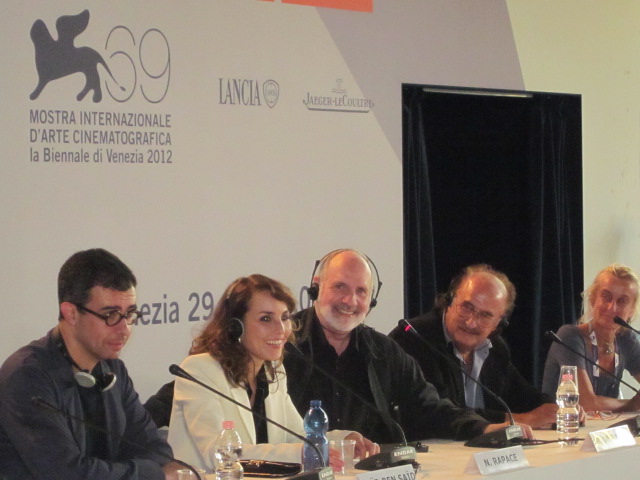
De Palma, Rapace, and Donaggio were all in Venice this morning for a Passion press conference, and all seemed in good cheer. The below is a rough translation of a transcript found at News Cinema. Thanks to Maurizio Rossi (and Google translator) for help with some of the translation.
--------------------------------------
You have made many thrillers but it's been so long. How did you come to this project?
Brian De Palma: There are two great characters of women and I was lucky because Noomi and Rachel already knew each other. I thought I'd better alter the film, concealing the identity assassin and I could still put my signature.
In the final scenes the woman with red hair puts the phone to the laptop and says it is trackable, but bought one just to call the inspector. So it sounds as if no one has the number?
De Palma: It 'a dream :)
You were six years away from the set and the film world. What did you do in the meantime?
De Palma: I tried to do the film.
Why did you shoot the film in Berlin?
De Palma: The majority of the funding came from Germany. The film was to be shot in London, but with the producer we found location in Germany so why not? The German crew was fantastic and the film was shot in 39 days ending well in advance.
Lots of people criticize you for an 80s kind of cinema, but the movie opens with a smartphone under water. Is this a way to relate it to our time? And how did you develop the original Courneau screenplay? The two main characters already know each other here, while in the original screenplay they do not.
De Palma: Phooey (laughs).
Noomi how did you prepare for the role?
Noomi Rapace: Every role that I accept I have to find a way to understand it 100% and I have to understand and translate myself in this person. Isabelle has been difficult because it's different from what I did in the past. It’s a break in the past within herself but has a delayed reaction. Her thoughts run in a particular psychological landscape and to understand it best I talked to a doctor of psychosis and Brian to figure out how to do it. We discussed a lot to deeply understand the character.
You said in the press release that it is a film for women and not only about women?
De Palma: Yes, the characters are women, they do things together that surprised me and I was lucky because they know each other well and the kiss of death was ... wow
Noomi Rapace: I wanted so much to work with Rachel. I was lucky because it is a chance to live this competitive relationship. The two women always raise the stakes and it all becomes a spiral that spins quickly, even though they are similar, but in different ways. I got into her soul, with crazy dreams and I had a dark side inside of me for a few days.
The language of new media can be felt in some of your works. Are you a prophet?
De Palma: When I made the film Hi Mom! in the late 60's, I talked about the TV and reality and I wondered what could come out of this. In Redacted I tried to see how to use stories to build a narrative.
As for the music, the film seems to consist of two scores for two different movies?
De Palma: Working with Pino since Carrie and I thought a lot about music selection to find the right one for each scene, I have given him some ideas and he made the final choice. At first the girls prepare new ideas, and they begin their growth. Then everything becomes twisted and takes a left turn, and then the music ... very special for the final scene.
Pino Donaggio: I followed the tone of the film’s changing events, accompanying images and increasing the tension. I just followed the work of Brian. Initially milder and then increasingly complementing the suspense until the final crescendo.
What is your idea of a thriller?
De Palma: A thriller is the ability to tell the story from the point of view of visual images and music. This story helped me to expand these capabilities in two key sequences, with great interaction between the two actresses and the ability to build the visual image.
Noomi Rapace: We found our parts in the shooting, there was not much in the scripts. Some scenes were more sexually oriented, others less so.
Why the choice of split screen in the scene of the ballet?
De Palma: I like that ballet rendition of Afternoon of a Faun and I have seen several videos from the 60's. I liked the choreography and the idea behind it. There's a line of Noomi’s, "I went to see the ballet," and so I tried to draw the audience into the dance so they will not focus on the murder that takes place at the same time. Directors are looking for good scripts, this came from France, I lived in Paris and while there I did Femme Fatale. Mission: Impossible was filmed worldwide. There are beautiful places in the world and it would be nice to shoot a film exclusively in different countries, each with its own star.
Hitchcock and Bernard Herrmann are associated with music/cinema, as are Donaggio and De Palma. What are the requirements for a good soundtrack?
De Palma: I worked with Pino but also with other great composers. Depending on the type of film I choose the person, even for the photography etc ... I'm not afraid of change. I'm fortunate with Pino to have put together films made in our own way and that we are happy with.
What is the role of fashion in the movie?
De Palma: I do not pay much attention to what I wear, but I have a keen eye on others. I see that Noomi is very good but I do not know who made this dress ...
Noomi Rapace: Brian knows everything at once, something is okay or goes wrong. We had testing of clothes from big names and he saw at once what was wrong or right. What happens to the character alters her clothes, and the director helped me a lot to understand the transformation, when she moves or plans things in advance, etc. .. The clothes are a uniform for these women and changes in the little details say a lot.
In your films, it seems that everything is about to collapse. You are always asking 'what comes next'. Do you achieve this effect more from directing or from the script?
De Palma: I had a very good movie, good characters and a 'good fiction. I brought ideas for a sexy thriller.





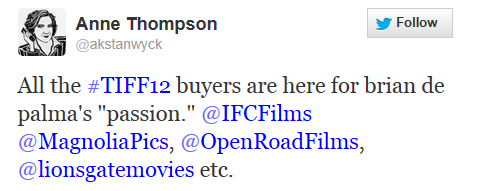

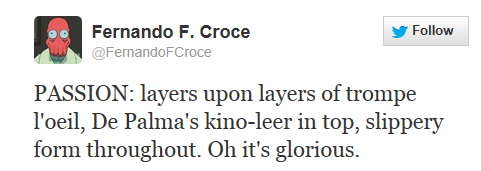
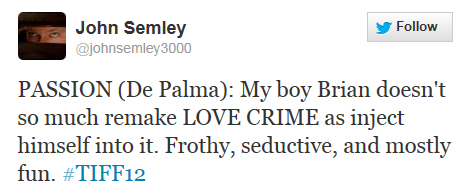
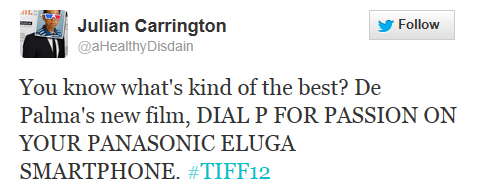
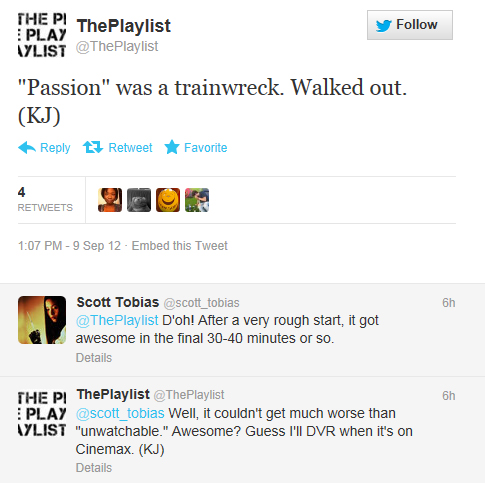
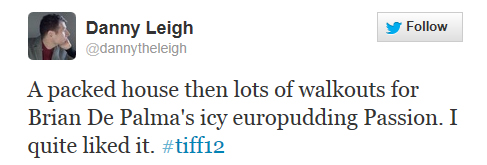


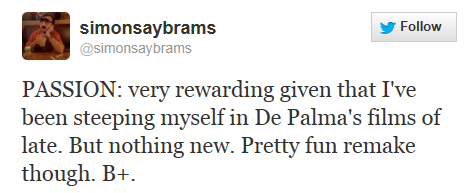
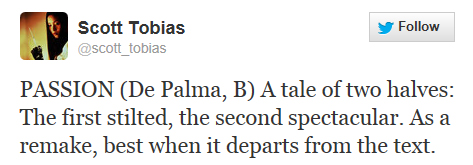

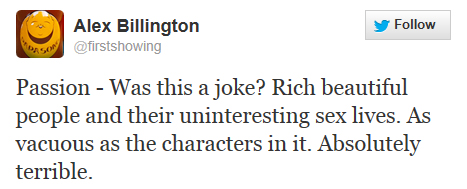

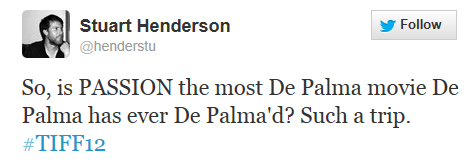
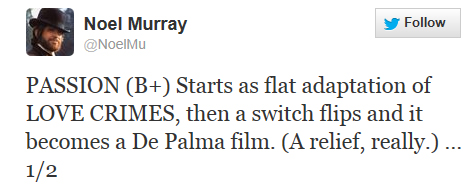
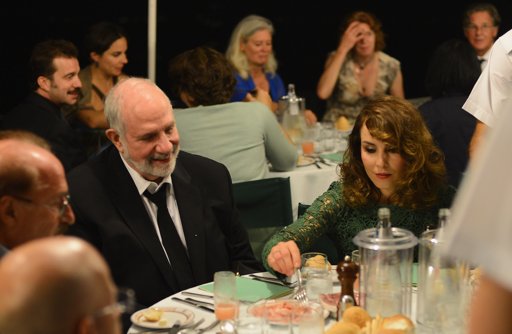

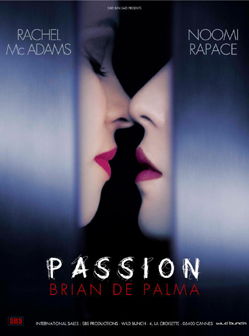
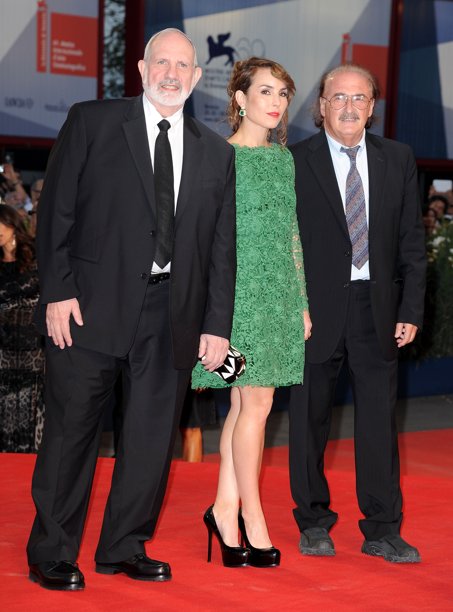


 A press screening of Brian De Palma's Passion this morning at the Venice Film Festival
A press screening of Brian De Palma's Passion this morning at the Venice Film Festival 

 The last time Brian De Palma brought a film to Venice, five years ago, he won the director's prize, the Silver Lion, for Redacted. Jury member Alejandro Gonzalez Inarritu presented the award to De Palma, who in accepting it, said, "Prizes are always great because it helps your film to be seen. But critics and prizes just tell you what the fashion of the day is. We don't make movies to get prizes." The jury that year was made up completely of film directors, headed by Zhang Yimou, and featuring, along with Inarritu, Paul Verhoeven, Jane Campion, Catherine Breillat, Ferzan Ozpetek, and Emanuele Crialese. It was great to see De Palma and Redacted recognized by an international jury of fellow film directors.
The last time Brian De Palma brought a film to Venice, five years ago, he won the director's prize, the Silver Lion, for Redacted. Jury member Alejandro Gonzalez Inarritu presented the award to De Palma, who in accepting it, said, "Prizes are always great because it helps your film to be seen. But critics and prizes just tell you what the fashion of the day is. We don't make movies to get prizes." The jury that year was made up completely of film directors, headed by Zhang Yimou, and featuring, along with Inarritu, Paul Verhoeven, Jane Campion, Catherine Breillat, Ferzan Ozpetek, and Emanuele Crialese. It was great to see De Palma and Redacted recognized by an international jury of fellow film directors.